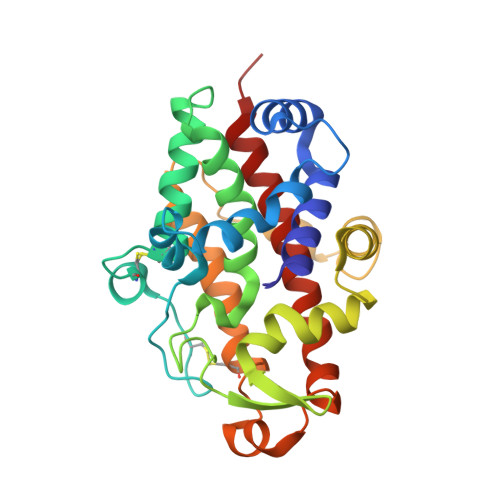Structural and Catalytic Properties of S1 Nuclease from Aspergillus oryzae Responsible for Substrate Recognition, Cleavage, Non-Specificity, and Inhibition.
Koval, T., stergaard, L.H., Lehmbeck, J., Nrgaard, A., Lipovova, P., Duskova, J., Skalova, T., Trundova, M., Kolenko, P., Fejfarova, K., Stransky, J., Svecova, L., Hasek, J., Dohnalek, J.(2016) PLoS One 11: e0168832-e0168832
- PubMed: 28036383
- DOI: https://doi.org/10.1371/journal.pone.0168832
- Primary Citation of Related Structures:
5FB9, 5FBA, 5FBB, 5FBC, 5FBD, 5FBF, 5FBG - PubMed Abstract:
The single-strand-specific S1 nuclease from Aspergillus oryzae is an archetypal enzyme of the S1-P1 family of nucleases with a widespread use for biochemical analyses of nucleic acids. We present the first X-ray structure of this nuclease along with a thorough analysis of the reaction and inhibition mechanisms and of its properties responsible for identification and binding of ligands. Seven structures of S1 nuclease, six of which are complexes with products and inhibitors, and characterization of catalytic properties of a wild type and mutants reveal unknown attributes of the S1-P1 family. The active site can bind phosphate, nucleosides, and nucleotides in several distinguished ways. The nucleoside binding site accepts bases in two binding modes-shallow and deep. It can also undergo remodeling and so adapt to different ligands. The amino acid residue Asp65 is critical for activity while Asn154 secures interaction with the sugar moiety, and Lys68 is involved in interactions with the phosphate and sugar moieties of ligands. An additional nucleobase binding site was identified on the surface, which explains the absence of the Tyr site known from P1 nuclease. For the first time ternary complexes with ligands enable modeling of ssDNA binding in the active site cleft. Interpretation of the results in the context of the whole S1-P1 nuclease family significantly broadens our knowledge regarding ligand interaction modes and the strategies of adjustment of the enzyme surface and binding sites to achieve particular specificity.
Organizational Affiliation:
Laboratory of Structure and Function of Biomolecules, Institute of Biotechnology CAS, v. v. i., Biocev, Vestec, Czech Republic.


















